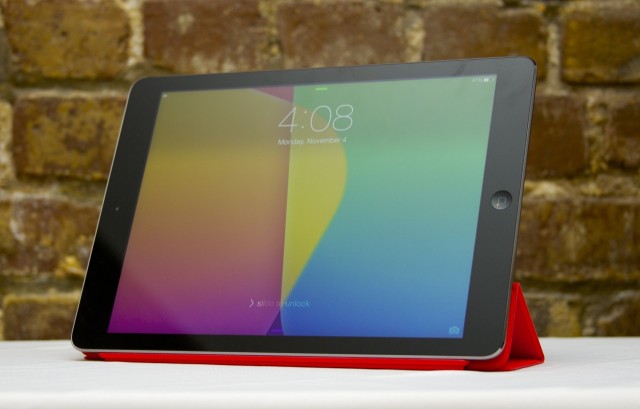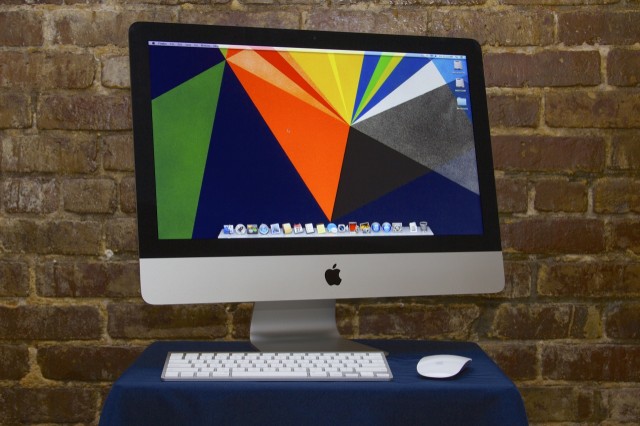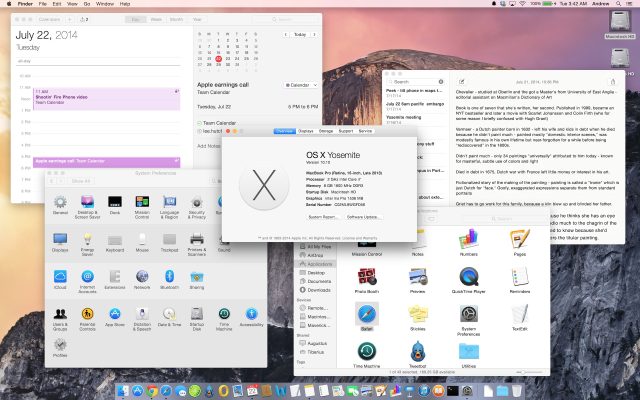When it rains, it pours—Apple introduced no truly new products for the first eight months of 2014, but tomorrow we'll be attending its second media event in as many months. In September we got two new iPhones, a new version of iOS, and a preview of the Apple Watch, but all of those products represent just a sliver of Apple's complete hardware lineup. For tomorrow's event, Apple will reportedly be turning its attention to its tablets and computers. Here's all of the most credible information about what we'll be seeing.
New iPads

iPad sales have leveled off a bit lately, but in terms of both revenue and units sold, the tablet is still Apple's second-largest product line. For the third October running, Apple is set to introduce new tablets. The interesting thing is that we've seen plenty of part leaks for a new iPad Air, but much less solid information about a new iPad Mini—we're assuming both will be updated in some way, but the bigger tablet may end up receiving the bigger boost.
We wouldn't expect the physical appearance of last year's iPad Air and Retina iPad Mini to change a whole lot, but some part leaks are already showing us what to expect on the inside. Apple's TouchID fingerprint sensor is reportedly set to migrate from the iPhone to the iPad. The aforementioned part leaks and other rumors suggest that at least the larger of the two iPads will use a more powerful A8X processor and 2GB of RAM, the latter of which would be a first for any iOS device.
Based on past iPad SoCs, we'd expect the A8X to use the same dual-core CPU as the A8 in the iPhone 6 and iPhone 6 Plus, paired with a more powerful GPU and possibly a wider memory interface to boost graphics performance. The GPUs are usually from the same family (in this case, the Imagination Technologies Series 6XT) to make API support the same across all products, but Apple uses more GPU cores to get better performance.
Other reports indicate a fairly straightforward spec refresh. Expect the screens to retain their current sizes and resolutions, but they may be fused with the tablets' front glass to improve color and contrast and make the tablets slightly thinner (the air gap between glass and display was one of our chief complaints about the Air last time around). Repair outfits like iFixit tend to hate that sort of thing, but it does provide tangible benefits to consumers. The camera is said to get a bump from 5 to 8 megapixels. And, oh yeah, they're supposed to come in gold, too.
As for the $399 iPad 4 and the $299 iPad Mini, we don't have as much past precedent to go on so it's harder to say what Apple will choose to do here. It's probably safe to say the first-generation iPad Mini is on its way out, since it's substantially identical to the iPad 2 on the inside, and that hardware is beginning to struggle with iOS. The iPad 4 is going on two years old, but it still runs iOS pretty well, and Apple kept the last $399 iPad in that spot for close to two years.
In an ideal world, the current iPad Air and Retina iPad Mini would both drop down to the $399 and $299 price points and replace the older tablets entirely. We'll have to wait and see.
A Retina iMac

Advance news about updated Macs is scarce. The computers typically sell fewer units than iPhones or iPads, which leads to less mainstream interest. More Macs are being built domestically, too, which means fewer information and part leaks than what we get from the overseas supply chain.
That said, people in a position to know are saying we're due to get a new Retina iMac tomorrow—it would be the second of Apple's Macs to go Retina, and it would follow the first Retina MacBook Pro by more than two years. The screen will be the most exciting part about these new computers, but it's also the thing we know the least about. It's not clear what size the computer will be (current models are 21.5 and 27 inches; most 4K-and-up panels are on the larger side, though). We don't know if we should expect multiple models, or just one. We don't even know what resolution the screen will be, exactly. Quadrupling the number of pixels in either the 21.5 or 27-inch iMac would give you a resolution of either 3840×2160 or 5120×2880. 9to5Mac has spotted references to 6400×3600, 5760×3240, and 4096×2304 screens in Yosemite betas. Any of that could be on the table.
We don't know what will be on the inside, either, but it's much easier to guess because there are only so many options. Bet on quad-core Intel processors based on the Haswell architecture, since next-gen Broadwell CPUs suitable for desktops won't be available until early in 2015. Screens with such high resolutions will require reasonably powerful GPUs, too. Depending on whether Apple continues with Nvidia chips or hops back to AMD, we could see either a newly released GeForce 900M-series chip based on the new Maxwell architecture or an AMD M200-series GPU.
Whatever this new iMac looks like, we wouldn't expect it to replace the regular non-Retina models any time soon. When Apple introduced the original Retina MacBook Pros, they cost considerably more than the non-Retina laptops. Apple offered both through most of 2012 and 2013. When the second-generation models shipped in later 2013, Apple dropped the price and eliminated most of the non-Retina products. A similar rollout for the new iMacs would make the most sense.
OS X and iOS

Apple has been issuing "golden master" candidates for OS X Yosemite to developers and public beta testers for more than two weeks now. That means the software is close to done, and we wouldn't be surprised if Apple releases the software to the public on the 16th as it did with Mavericks last year. John Siracusa's thorough review will follow shortly after Yosemite is released, whenever that happens.
As for iOS, Apple has been testing betas of iOS 8.1 for the past few weeks. The update should enable support for Apple Pay in the iPhone 6 and 6 Plus, as well as the last of the Continuity features that will let iOS and Yosemite share data more seamlessly. We'd expect the software to come out around the same time as Yosemite and for it to be the version of iOS that ships on whatever new iPads Apple announces. A leaked memo from Walgreens indicates that the pharmacy chain will be rolling out Apple Pay support on October 18, which suggests iOS 8.1 will be out on or before that date. We'll be giving iOS 8.1 and Apple Pay a closer look after they're released.
And the rest
Apple's got a lot of other products, but none of them are guaranteed to get stage time tomorrow. Let's give them a quick rundown.
If you're waiting for more Macs, the Mac Mini and Mac Pro are the most likely candidates for a refresh. Intel has Haswell and Haswell-EP CPUs that would be suitable for both computers, which are still using Ivy Bridge and Ivy Bridge-EP CPUs, respectively. Reports indicate that the long-rumored Retina MacBook Air will be a no-show, and no reports have said much of anything about new Retina MacBook Pros. We'd expect that both refreshes are hung up waiting for suitable Broadwell processors from Intel (and their upgraded integrated GPUs).
Apple's neglected iPod line hasn't been touched since 2012, but the dedicated music players and the iPod Touch account for so little of Apple's revenue these days that we expect they'll soldier on untouched. Those products have historically been refreshed in September, and Apple gave them no mention at the iPhone event last month. There's also the Apple TV box, which hasn't seen a substantive hardware update in two-and-a-half years. While rumors of an updated Apple TV have been going around for months now, the latest reports suggest that Apple's TV plans are being held up by negotiations with cable companies.
All in all, it doesn't look like Apple will be making any earth-shattering announcements tomorrow, but many of its existing product lines will be getting solid upgrades. Whatever happens, we'll be liveblogging Apple's event tomorrow, and the hardware and software the company announces will get the full review treatment in the coming days and weeks.
Listing image by Andrew Cunningham
reader comments
69